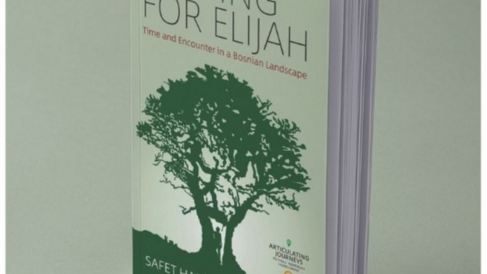
This week we welcome the publication of CIP associate Dr Safet HadziMuhamedovic's monograph Waiting for Elijah in paperback. Based on extensive fieldwork in Bosnia, the book focuses on the harvest feast of Elijah's Day.
The paperback edition includes a new foreword from Dr Marko Živković (University of Alberta). Reviewers of the hardback edition have shared praise for the work:
“This is an exceptional socio-anthropological study of communal religious festivities and practice … that continuously seek out ways to transgress national and ethnic divisions. It also queries the meaningfulness of doing ‘ethnography after ethnic cleansing’, while arguing that retaining the notion of ethnicity implies its essentiality for the anthropological analysis of what happened during the war in BiH. … HadžiMuhamedović does not understand ethnicity as a master category and opts for an innovative method of ‘chronography’, which unfolds multiple facets of ‘time-reckoning’ (i.e. waiting) and communal sharing without implying ethno-religious divisions of a ‘Bosnian landscape’. … The authentic language in which the text is produced submerges and tantalises the reader with its poetic intensity…” --Marija Grujić, Social Anthropology.
“Waiting for Elijah is a forceful, poignant, and illuminating intervention … profoundly a book about home. [It] could join other anthropological classics that deal with people’s attachment to their landscapes… [T]he book is painfully poignant, to the point of producing a lump in the reader’s throat. It is at the same time a sophisticated scholarly work engaging with anthropological and other literatures. HadžiMuhamedović is quite aware of the tension this produces. It is obvious that he has to answer both the call of a poet and that of a scholar” -- Marko Živković in Anthropos
“In his brilliant ethnography Waiting for Elijah: Time and Encounter in a Bosnian Landscape, HadžiMuhamedović writes of Bosnia’s postwar protracted uncertainty.The supernatural holds the place for the unknown here in an ethnography that addresses the spiritual voids that mass violence creates among survivors.” -- Yael Navaro, Annual Review of Anthropology
“Carefully written, beautifully articulated, and theoretically important, this book makes an enormous contribution to the anthropology of landscape. Much of the work on Bosnia in anthropology and allied disciplines now claims to ‘go beyond’ the ethnic categories and legacies of violence that drive funding and western researchers to the region, but very few actually manage to do so. I think this book is one of the few. In addition to its more traditionally academic first part, the second part of the book attempts to represent and work with the themes of the work through a more free-flowing, poetic style. Taken together, they offer an engrossing portrait of life in a part of Bosnia that some might describe as "once vibrant" – HadžiMuhamedović shows how that past vibrancy resonates into the present, saturating time, life, and landscape in Gacko.” -- GoodReads
“This is a remarkable anthropological study of the traces of intercommunal living in the ‘Field’ of Gacko… [It] offers mesmerizing moments of poetic beauty and clarity. [T]he book is a towering monument to the intimately shared and connected lives that were violently erased, and one of the most original contributions to the anthropology of the region.” -- Ger Duijzings, Slavic Review
“[The book] opens up new ways of approaching the plurality inherent to Bosnian society, a plurality that has long been subject to politically motivated and violent deconstruction. Key to this deconstruction is the stereotypical and ideological denial of any overarching Bosnian framework. Applying current anthropological approaches to the study of Bosnia's social pluralism, Safet HadžiMuhamedović demonstrates clearly the subtle, but undeniable presence in interlocking levels of personal and collective identity of recognisably Bosnian patterns of social and cultural complementarity and cohesion. … At the heart of his approach and of his findings is the reality that Bosnian society is essentially interreligious and that none of the constituent groups is an independent or self-sufficient social reality.” -- UN World Interfaith Harmony Week
For further information about this publication, please visit the website of the publisher Berghahn books. Quote HADZ2193 to receive a 25% discount on the RRP (valid for orders direct from the publisher).
Safet HadžiMuhamedović is a social anthropologist based in the Faculty of Divinity. He has been an active research associate within Cambridge Interfaith Programme, where his contribution included convening our online Summer School in 2021. He is currently teaching courses in the anthropology of religion, and conflict and interfaith relations. He has conducted ethnographic fieldwork in Bosnia and the wider Mediterranean for over a decade and has been a recipient of numerous prestigious research awards.
